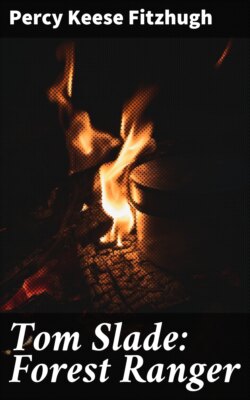Читать книгу Tom Slade: Forest Ranger - Percy Keese Fitzhugh - Страница 8
На сайте Литреса книга снята с продажи.
CHAPTER VI
THE WIND IN THE EAST
ОглавлениеTable of Contents
It was several weeks after his first chance visit to Watson’s Bend that Tom drove there, bag and baggage, to begin his employment as fire lookout. The main road had been reopened, which fact had consigned Watson’s Bend to an even more remote obscurity than when Tom had first paused there. It was now completely buried with all its gossipy and ignorant superstitions, and the village store with its reminiscent trio seemed to Tom like a fragment of a dream.
There was something amusing in the thought of how Skunk Hollow and Irish Pond, Todd’s Crossroads and Derry Conner’s woods and Lizey Henk’s man, who was tipsy, and Chevy Ward and all the rest, were brought forth and given an airing, then put away again never more to be heard of by the world. There was a detour and presto, Watson’s Bend appeared, then suddenly withdrew again into its grave-like seclusion. As Tom thought of these things it seemed to him that his visit there had been like a sojourn to fairyland. He had a queer feeling that he would not find the place now, that the hamlet and its people were no more real than the white rabbit and the mock-turtle in Alice in Wonderland.
These apprehensions were perhaps somewhat encouraged by the dismal, wind-swept storm through which he drove. It was, as he observed to himself, an altogether fitting day on which to commit a murder. On this second descent upon the hamlet he left the main road, as he had been told to do, at Ferncliff Valley and so, of course, approached the scene of his adventures from the south. There was no reason to suspect that this road was ever serviceable to man except in role of detour. Detours, like excavations at the sites of ancient cities, are likely to unearth interesting relics. Do not scorn (much less swear at) the little arrow; it may point out the pathway to romance.
At somebody or other’s “Crossing” Tom’s fickle Lizzie lay down and it was nearly two hours (and then only after the most abusive treatment) before he could persuade her to start again. Hence it was evening before he drove along the foot of the spreading mountain which rose away to the left of him. It looked gloomy enough off there on the dense summit as he saw it through the rain and mist.
He could not see the top of the old lookout station at all as he drove along, and he almost steered off the road into the low land to the right as a consequence of trying to pick it out. The mountain looked different than before by reason of the thickening foliage. “I suppose there’s a trail up there,” Tom mused. “It will be a fine night for mountain climbing.”
In the springtime Nature is a lightning-change artist, donning her mantle of foliage suddenly. The whole scene had changed since Tom had been in the neighborhood before. If he had gone around the Bend and found that the village was not there, he would not have been greatly astonished. Even the sharp turn looked different; not quite so dangerous as when he had first seen it.
Watson’s Bend was not out to welcome the stranger. A more dismal scene than the hamlet presented could hardly be imagined. There was no sign of life now even at the village store. A waterfall poured off the platform roof and the steady sound, even of this, seemed companionable in the general gloom.
The big, white house standing well back on its extensive lawn across the road caught Tom’s notice now, as it had not before, for he knew it for the mansion of the absent Wolfson Peck. It seemed out of keeping with the rest of the village, pretentious and aloof. A white picket fence enclosed the grounds. Smoke was pouring out of a chimney of the house, but the wind and rain beat it down and it broke up like clabbered milk and dropped away below the roof level. Yet it seemed cheerful on such a day.
Back on the grounds, and just within the side fence was an ornamental well-house painted white, and beyond, some distance off, a wretched little unpainted house. As he drove past, Tom had a momentary fancy of that humble well suddenly brought within the exclusive area of pomp and circumstance and white paint and imbued with a haughty contempt for the lowly home which had unsuccessfully claimed it.
Was it in that poor little house beyond that Henny Vollmer lived? Tom laughed at the thought of the boy killing a man in order to obey the rules of scouting! Well, at all events, old Peck must have returned, and it would be cheerful with a fire going on such a day, with night coming on....
On the ornate well-house was a gilt weathervane showing that the wind was in the east. The bucket suspended blew in the impetuous gusts and banged against the sides of the trim enclosure. It was not a cheery sound and it bespoke a dismal night.
